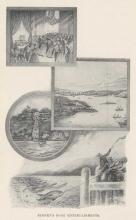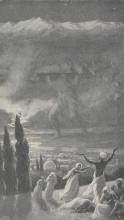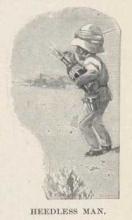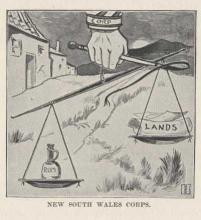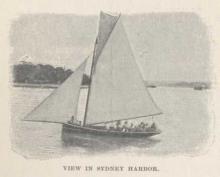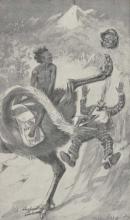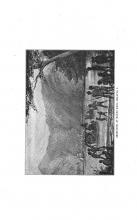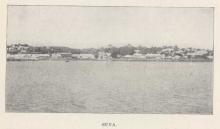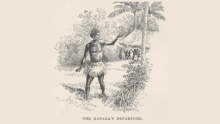Australian invests in public works such as government buildings, hospitals and parks. The Governors were generally "away" leaving the lieutenant-governors in charge. Apparently, governors did return for the Governor's Ball, a major event. Twain goes on and tells the tale of Cecil Rhodes' first fortune.
A comparison of Hindoo mythology with Christian. Who was infused with greater strength, Samson or Hanuman? From Rasmussen: "...Clemens dreams that the visible universe is the physical body of God... human beings and other creatures are mere microbes. A missionary, Mr. X., finds Clemens's dream similar to sacred Hindu accounts of their origins. He thinks that one reason Christianity does not catch on in India is that its miracles pale next to those of Hindu legends."
Australians resemble Americans but Sydney is an English city albeit with American trimmings. Squatters are of a different sort, however. It is the Australian term for wealthy landowners. Important differences also exist for pronunciations.
Not about his travels but about the initial colonization of Australia with English convicts and their harsh treatment with the cat-o-nine-tails. The British colony founded by Captain Cook in 1770 and the establishment of the Australian and Tasmanian penal colonies. Twain then goes on to the corrupt "protection" organization, the New South Wales Corps and the setting of rum as the national currency. The state of New South Wales, by the establishment of mining and wool ranching, eventually developed into a thriving region.
September 15th, the Warrimoo approaches Sydney harbor. Twain relates the story of the ship, the Dunbar (Twain refers to the ship as the Duncan Dunbar which was actually a different ship), breaking up on the rocks at the harbor entrance in 1857. Twain writes of the beauty of Sydney but Australia's interior brings to mind Nevada's dust storms, the Zephyrs.
Twain become acquainted with an English naturalist who lives in New Zealand and learns of the natural history of Australasia, particularly the platypus, Ornithorhyncus.
William T. Wawn, Master Mariner and captain of the schooner Stanley, was a capitalist and capitalism treats everything as a commodity including people. The dedication in his book, The South Seas Islanders and the Queensland Labour Trade provides an excellent illustration of just what his biases are:
I've been reading, and mapping locations from a book about the Queensland/Kanaka trade, written by the captain of one of the ships used to "recruit" Kanakas to work the sugar cane fields of Queensland, Australia, _The South Sea islanders and the Queensland labour trade_ by William T. Wawn.
Wednesday, September 11, 1895. Made port at Suva, the capital of the Fiji Islands.. After dinner I found in the billiard-room a resident whom I had known somewhere else in the world, and presently made some new friends and drove with them out into the country to visit his Excellency the head of the State. Fiji's last king ceded the islands to Britain, 10 October 1874, in order to prevent an American occupation.
Subscribe to
© 2026 B Scott Holmes, All rights reserved.
